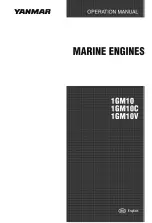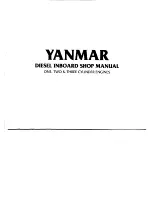
Section 3 - On The Water
90-899883234 JANUARY 2008
Page 37
Most boats are rated and certified for a maximum load capacity. Know your boat’s loading
limitations (refer to the boat capacity plate). If in doubt, contact your dealer or the boat's
manufacturer.
Never boat under the influence of alcohol or drugs.
It is illegal to operate a boat under the influence of drugs or alcohol. Alcohol or drug use
will impair your judgment and drastically reduce your ability to react quickly.
Make sure that everyone in the boat is properly seated.
Do not allow anyone to sit or ride inappropriately on any part of the boat. Inappropriate
riding locations include seatbacks, gunwales, the transom, the bow, decks, raised fishing
seats, any rotating fishing seat, or anywhere that sudden acceleration, stopping, loss of
boat control, or other movement could throw a person into the boat or overboard.
Wear a personal flotation device (PFD) at all times while in the boat.
Federal law requires an approved personal flotation device for every person aboard, as
well as a throwable cushion or ring. Flotation devices must fit correctly and be readily
accessible.
Know your boating area and avoid hazardous locations. Be alert.
By law, boat operators are responsible for ensuring that they can see or hear indications
of danger. In particular, the operator’s forward view should not be obstructed by
passengers, cargo, or removable seats. Be aware of others, the water, and your wake.
Never follow a water skier.
Your boat will quickly overtake a fallen skier. If a skier falls, a boat following 61 m (200 ft)
behind at 40 km/h (25 mph) will overtake the skier in five seconds.
Watch fallen skiers.
Never back up to anyone, including skiers, in the water. The operator should always keep
the skier in sight, and on the operator's side of the boat while returning to assist the skier.
Report accidents.
Boat operators are required by law to file a Boating Accident Report with their state boating
law enforcement agency when their boat is involved in certain boating accidents.
A boating accident must be reported if there is:
• Apparent or probable loss of life.
• Personal injury requiring medical treatment beyond first aid.
• Damage to boats or other property where the damage value exceeds $500.00.
• A complete loss of the boat.
IMPORTANT: Consult local law enforcement for a complete explanation of rules and
regulations.
Be Alert to Carbon Monoxide Poisoning
Carbon monoxide is present in the exhaust fumes of all internal combustion engines
including the outboards, sterndrives and inboard engines that propel boats, as well as the
generators that power various boat accessories. Carbon monoxide is a deadly gas that is
odorless, colorless and tasteless.
Early symptoms of carbon monoxide poisoning, which should not be confused with
seasickness or intoxication, include headache, dizziness, drowsiness and nausea.
Summary of Contents for Axius 350 MAG
Page 26: ...Section 1 Warranty Notes Page 18 90 899883234 JANUARY 2008 ...
Page 42: ...Section 2 Getting to Know Your Power Package Notes Page 34 90 899883234 JANUARY 2008 ...
Page 76: ...Section 4 Specifications Notes Page 68 90 899883234 JANUARY 2008 ...
Page 120: ...Section 5 Maintenance Notes Page 112 90 899883234 JANUARY 2008 ...
Page 138: ...Section 6 Storage Notes Page 130 90 899883234 JANUARY 2008 ...
















































